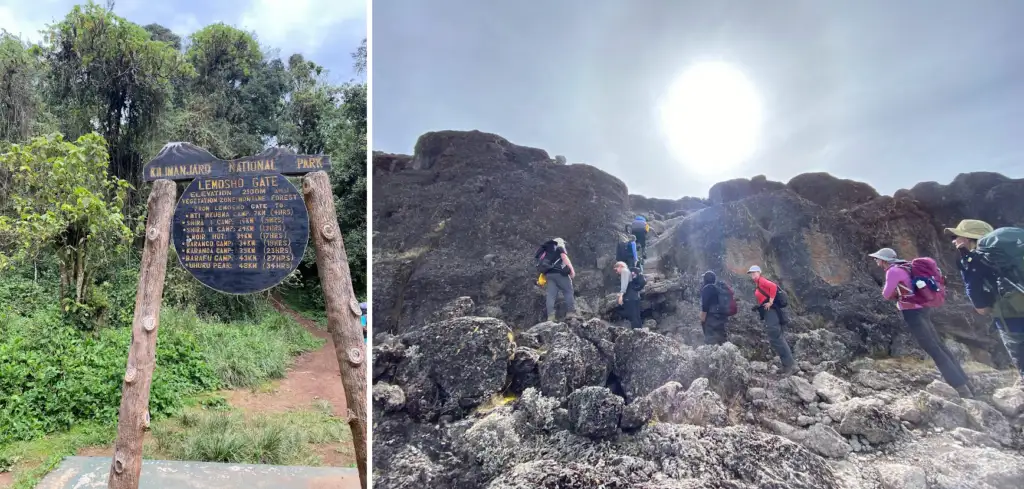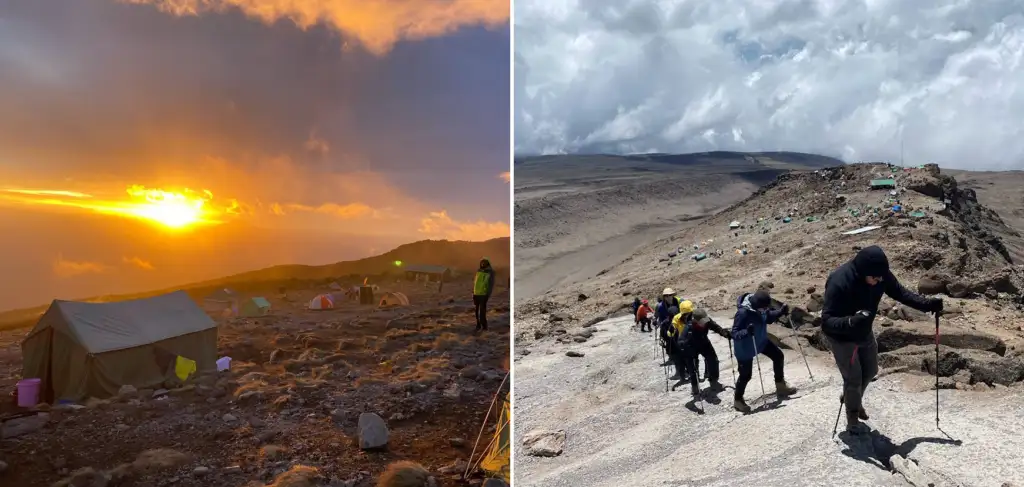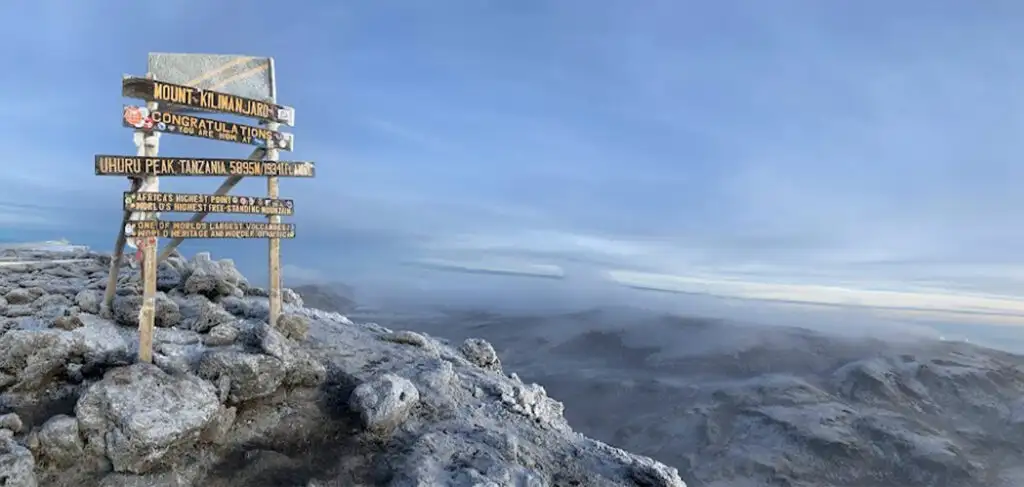Kilimanjaro is truly a once-in-a lifetime trip. The cost, hours of training, and planning you’ll devote to making it happen make the stakes feel really high. You’ll want to do everything you can to have the best chance of making it to the summit. So how do you stack the odds of success in your favor? There are two main things to consider: the route you take to the top, and the company that will get you there.
Choose the Best Route

Vacation time is limited, so it can be tempting to book the shortest Kilimanjaro trip possible. However, when it comes to Kilimanjaro, the longer the hike, the higher your chances of making it to the summit. A slower pace gives climbers more time to acclimatize to the altitude, lowering the chances of Acute Mountain Sickness (AMS), which is the most common reason for failure.
I opted to take the Lemosho Route with World Expeditions, which takes eight days on the mountain, because the company boasts a success rate of over 95 percent for that specific trek. I definitely felt the extra time, which allowed us to follow the tried and true advice of “climbing high and sleeping low” helped with my group’s 100 percent success rate.
Pick the Right Company
Even more important than choosing a good route is picking the best company to hike Kilimanjaro with. Once you’re on the mountain, you’ll be completely dependent on your tour operator for everything from your health and wellbeing to your comfort and happiness, so don’t just pick the first group you find in a Google search.
I’ve heard horror stories of people booking the lowest cost trip they could find, only to turn up and feel unsafe due to old equipment or sketchy guide practices. There are five major factors to consider when deciding who to trust with your trip.
Safety
The high altitude of Kilimanjaro makes safety a crucial consideration of every trip. You want to be sure that the company you choose takes the health and wellbeing of climbers seriously. For example, World Expeditions provides one guide for every two trekkers to better closely monitor hikers’ health. Emergency oxygen is carried throughout the trip, and all guides are highly trained in wilderness medicine. You’ll also need to purchase travel insurance before your climb.
Equipment and Amenities

When you’re on Kilimanjaro, you’ll see a wide range of setups for different tour operators, and you don’t want to be the one stuck in a tiny, leaky tent, enviously eyeing up other camps. World Expeditions uses large, mountain-quality tents that can withstand high winds and cold conditions. Hikers can rent four-season mummy sleeping bags (that were super warm) and plush sleeping pads that add to the comfort. Hiking poles and down jackets are also available to rent if you don’t want to overpack.
Second only to the altitude, my biggest pre-trip fear was going for eight days without running water, bathrooms, or showers, but my worries were literally washed away when bowls of warm water were delivered to my tent each morning for a luxurious “washy washy”. Washing water (and the handwashing stations provided before every meal) are not just a comfort—they are important for hygiene and staying healthy.
At every camp (and lunch stop), the World Expeditions team even set up two bathroom tents equipped with flushing toilets—a minor miracle in a place where every drop of water has to be sourced from nearby rivers.
Meals
You can burn around 4,000 calories a day hiking on Kilimanjaro, so the food plays a crucial role in getting you up the mountain. World Expeditions serves hearty, hot meals, three times a day that are designed to be hydrating and deliver maximum nutrients and protein to keep you fueled for the climb.
If you suffer from a severe food allergy, a trip like Kilimanajro might seem like something that won’t be accessible to you. Meals on treks are served family-style, and dishes are washed in a communal bucket, which could be disastrous if you can’t have cross-contact.
World Expeditions wants to help make Kilimanjaro accessible to everyone, and they offer guests the chance to have a private chef for an additional fee. The chef will cook in a separate kitchen tent, using designated pans and utensils to prevent any cross contact. They will also provide a dedicated waiter who serves only the allergic guest throughout the entire trip in order to avoid any potential mishaps.
Ethics
Want to have a positive impact on the trip? Leave the mountain better than you found it with World Expeditions’ 10 Pieces project. Participating hikers are given a lightweight stuff sack at the start of the trip and asked to pick up ten pieces of trash per day, which makes a huge cumulative impact in cleaning up the trails.
You’ll also want to book with a company that is a member of the Kilimanjaro Porters Assistance Project (KPAP), like World Expeditions. KPAP is a nonprofit organization that works to make sure the porters are treated fairly, paid well, have enough food to eat, get adequate time to rest, and don’t carry more weight than is safe.
Cost

Mount Kilimanjaro National Park charges a lot of fees for the privilege of hiking the mountain. These mandatory fees include an entrance ticket plus daily fees for camping, conservation, and more, and total more than $1,000 per person for most trips. When evaluating the cost of a package from different tour companies, factor in if the fees are included or will be charged additionally on top of the price you pay.
Also, keep these mandatory costs in mind when evaluating low-budget tours, as you don’t want to pick an operator that won’t have enough margain to properly pay staff, provide decent food, or have good equipment.
World Expeditions’ Lemosho Route trip starts at $3,950 and includes:
- 9 breakfasts, 8 lunches and 9 dinners
- 2 nights hotel in Arusha
- 7 nights fully-supported camping including tent
- Experienced guides, cooks, porters, and camp crew
- Emergency oxygen
- All taxes and fees
Editor’s note: The author of this story was hosted by World Expeditions on their Lemosho Route trip.
You Might Also Like:
• Bike Safety Tips: How to Stay Safe and Comfortable While Riding• How to Stay Sane When Planning a Trip with Friends
• 14 Tips for Choosing the Right Group Tour
• Italy Travel Guide: What to Do in Italy
• 10 Best Hidden Places in Ireland
We hand-pick everything we recommend and select items through testing and reviews. Some products are sent to us free of charge with no incentive to offer a favorable review. We offer our unbiased opinions and do not accept compensation to review products. All items are in stock and prices are accurate at the time of publication. If you buy something through our links, we may earn a commission.
Related
Top Fares From
Today's Top Travel Deals
Brought to you by ShermansTravel
Shop and Save with Country Inns...
Patricia Magaña
 Hotel & Lodging Deals
Hotel & Lodging Deals
$229 -- Chicago: Discounted Rates and...
Francesca Miele
 Hotel & Lodging Deals
$229+
Hotel & Lodging Deals
$229+
$188 -- Honolulu: Save on Oceanview...
Abigail Lamay
 Hotel & Lodging Deals
$188+
Hotel & Lodging Deals
$188+




